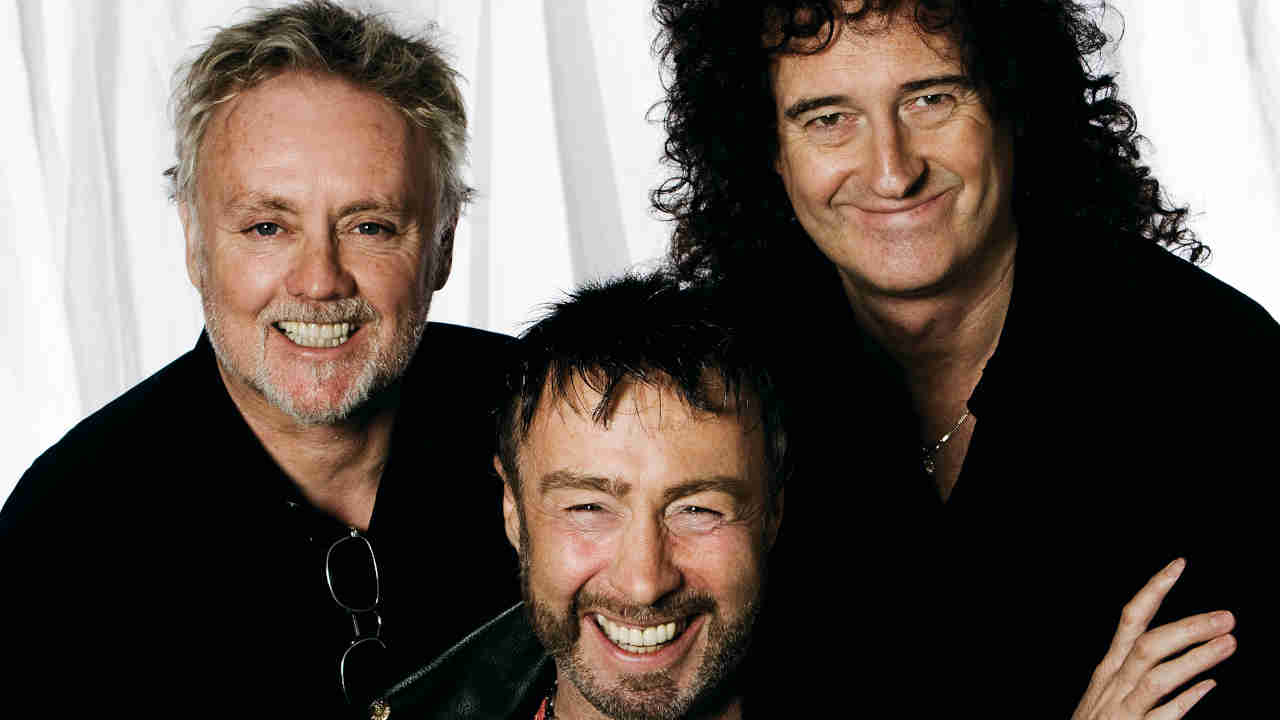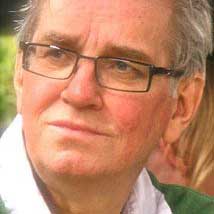After Queen singer Freddie Mercury’s death in 1991, the legendary rock band looked to be finished. But in 2004, guitarist Brian May and Roger Taylor teamed up with former Free/Bad Company singer Paul Rodgers under the name Queen + Paul Rodgers. In 2008. Classic Rock journalist Harry Doherty – who first interviewed the band in their 70s heyday – met with the band to talk about their new album, The Cosmos Rocks.

Back in November 1975 I was granted an audience with Queen. It was shortly before the release of the band’s magnus opus, the career-defining A Night At The Opera. I witnessed a group fussing and fretting – over what they would probably call the imminent escape of said record – so much so that they went back in the very next day and started remixing the whole blasted thing.
Almost 33 years later, I find myself in a state of déjà vu, but this time in a parallel universe. With Freddie Mercury sadly long departed, John Deacon gone, having taken on the mantle of enigmatic recluse, Brian May and Roger Taylor are now on the eve of releasing the first Queen album in almost 13 years, this time in collaboration with the legendary blues-rock icon, vocalist and founding member of Free and Bad Company, Paul Rodgers, joining them to create The Cosmos Rocks, under the banner of Queen+Paul Rodgers.
And again they seem to be facing the immediate future with the same sort of creative wariness, although this time they don’t have money worries.
“Well, the time around the release of A Night At The Opera was a period of crisis for us,” recalls Taylor. “Our backs were right to the wall financially. We had sold a lot of records and not been paid a lot of money – the old, old story really. So that album was our big shot. Had it failed, we probably wouldn’t have been around much longer.
“Apart from that financial crisis, I suppose it is the same in a way with the release of The Cosmos Rocks. However, I don’t think people really expect anything with this. But as then, we have got all this new material, and we have proved that we are a creative force and entity, and that this is a viable operation.”
For the beginning of this “viable operation”, we have to move back in time to September 2004, to the Fender Stratocaster anniversary concert at Wembley Arena when Brian May found himself on stage with Paul Rodgers – as the worthy substitute on guitar for one of his own heroes, the late Paul Kossoff – on Free’s All Right Now. From these humble, chaotic beginnings, the regeneration of Queen would begin…
“We came off stage knowing that the chemistry had flowed. It just seemed so natural to do that. It was Paul’s girlfriend, who is now his wife, Cynthia, who looked at us both and said ‘Something happened on there, didn’t it?’ She said ‘All you guys need is a drummer’, and I said ‘Actually, I know a drummer!’. It started off as a very small thing, as in ‘let’s do something with Paul and see what happens’.”
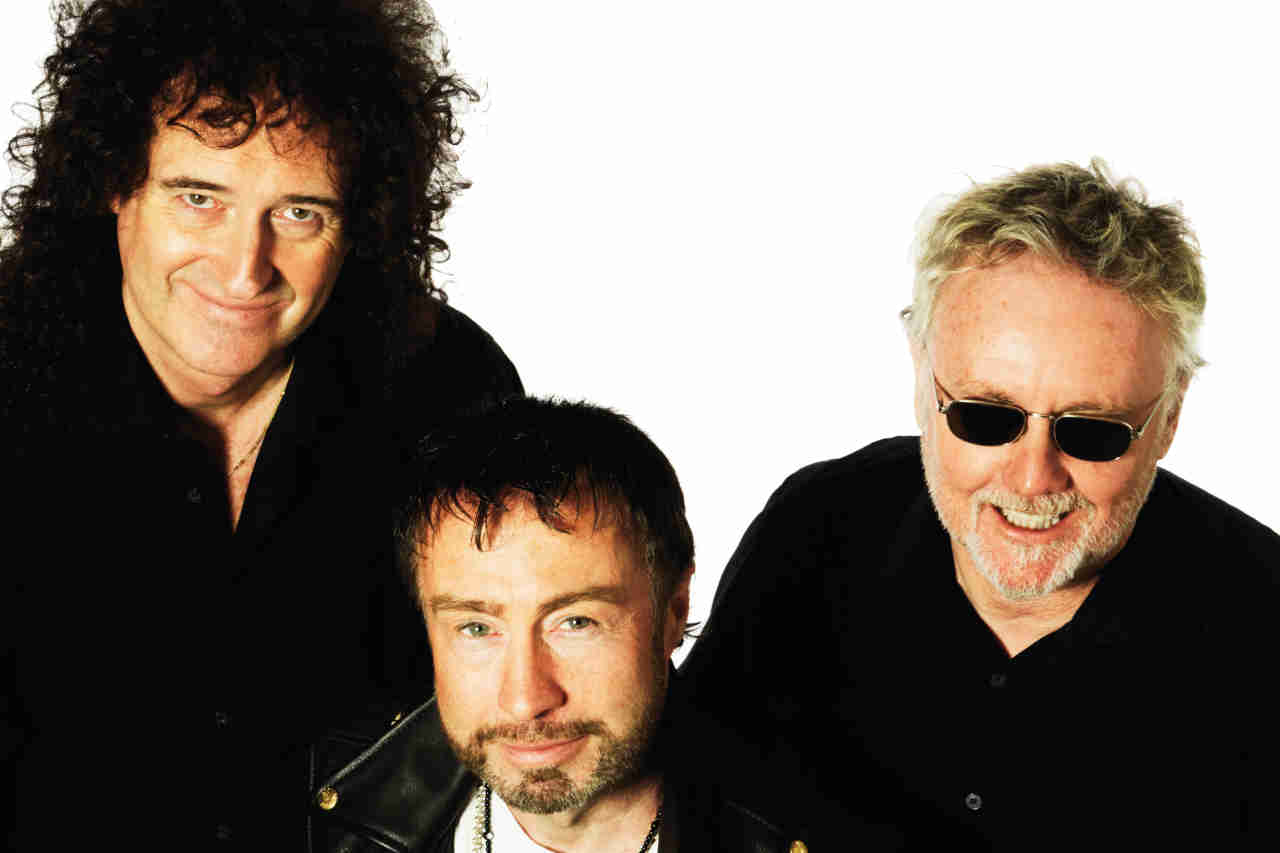
Faster that you could say ‘we will rock you’, a month later, Rodgers was joining May and Roger Taylor at the induction of Queen into the UK Music Hall Of Fame, with All Right Now joined by We Will Rock You and We Are The Champions in a slightly less chaotic but memorably historic mini-set.
“There wasn’t really that much to it, other than’This is interesting’,” reflects Brian May, bedded down in the car park of a huge industrial park in Tower Hill, London, where Q+PR are about to start the second phase of rehearsals for their forthcoming world tour. “But I have to say there was a moment there that was significant for me: when Paul pitched into We Are The Champions. It was so obvious that he was making it his own. It wasn’t anything like Freddie would have done and yet it carried the spirit of the song which Freddie had written. I suddenly thought, ‘This is a lot more than just playing this song; this is a new world that we can go into’.”
Rodgers was reaching the same conclusion. When it’s suggested to him that he probably thought this would be simply an interesting, but passing, experiment, he’s quick to disagree: “A little bit more than that actually. When we were rehearsing the songs at the UK Music Hall Of Fame, we had the janitors – and all sorts of other people who had seen it all – popping their heads in and saying ‘what the hell is going on in there?’. When we created excitement there, I thought that was pretty indicative of what we could have.”
The word soon leaked out to promoters that Queen and Paul Rodgers might consider touring together and offers poured in. When May called Rodgers to ask how he would feel about doing a tour, doing a set consisting of half Queen and half Rodgers catalogue (Free, Bad Company, The Firm, solo stuff), he was ready to take it to the next stage. But the singer insisted that the set should be “Queen-heavy” as they hadn’t been visible for so long. And he was very aware that it was still an unexpected collaboration.
“I always admired them from afar, but I can’t honestly say that I went out and bought all their records or knew all about them,” admits Rodgers. “If someone had called up out of the blue and said ‘How do you fancy doing this?’, I would have been a little more hesitant, but as we had actually played together, I knew that it worked on a very exciting level. The simple raw power that was coming off that stage was so exciting that I was very willing to do more and see where it took us. And that has really been the motivation behind everything that we’ve done. There was a mutual feeling of ‘This feels good, let’s do more’.”
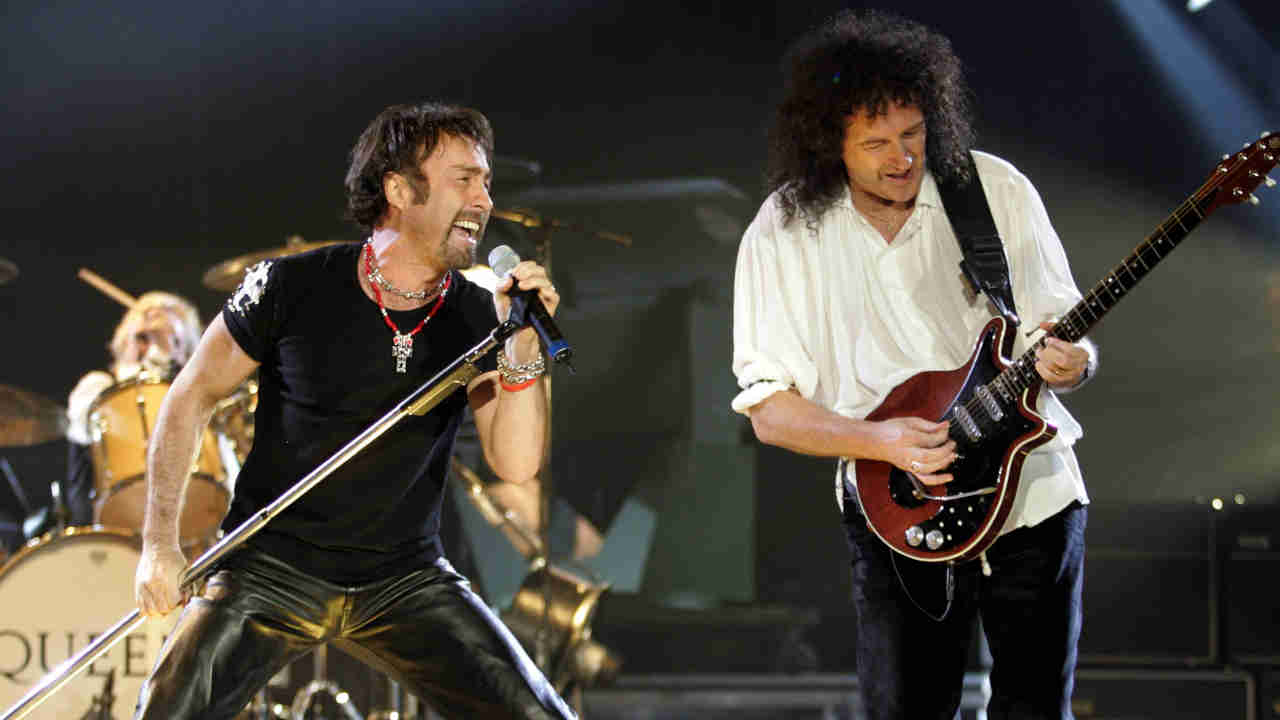
And so it came to pass that Queen+Paul Rodgers (more about the much-debated moniker later) set off on a tour that was just to start with a few dates and blossomed into a world tour, taking in Europe, North America and Japan, with the shows soon reaching the grandeur that Queen were famed for. They played a “best-of-both” set.
“Well, it had to be, didn’t it? We didn’t really have any new material then!” laughs Roger Taylor. And now they’ve been together for three years.
“We all went into it with an open mind,” adds May. “The essential base line was that it was organic; it wasn’t something that was shoved together to get us back out there or rejuvenate us. It just happened because we got on with Paul and we were excited about working with the guy.”
But from dipping their toes into the water, then their ankles and knees, Queen and Paul Rodgers were soon up to their necks in it. And apart from that, it was great fun.
“We took it one step at a time,” Taylor explains. “It was really a case of ‘Well, that worked, let’s try this.’ There was no master plan. Nobody really wanted to commit themselves that much. But I have to say that I’m really delighted to find myself at this stage in my life where we are. It’s very exciting.
“Obviously, we hoped it would grow and looking back at one of those first gigs at the Brixton Academy, it was pretty rough and ready. I remember it being over loud and we really hadn’t refined the process of working together. You’ve got to get that chemistry down, and it doesn’t always happen, but there definitely is a great chemistry between us. Paul’s given us a serious blues edge that we didn’t have before, and I like to think that we’ve given him a walloping great wall behind him.”
May points out that Rodgers had informed him the day before that this was the longest he had ever been in a band, and that includes Free and the initial glory period of Bad Company. The big test came as the tour was ending, and the consideration of what would happen next. It was after a gig in Vancouver that all concerned were saying their good-byes.
“Well, on those big tours, you’re away from home for months and months and there does come a time when you long to be home,” Rodgers explains. “So by the time everybody has reached the last show, they’re very much on the flight home in their minds. But on this tour, the very last show was in Vancouver, and it was the best show we did – it was absolutely scorching. We came off and everybody hugged and it was a case of ‘I’ll see ya, for sure! We have to do some more.’ We weren’t sure what that ‘more’ would be, but the natural step was to go into the studio and see what happened. Brian actually said to me ‘Let’s do more, I don’t want this to end’.”
What would that “more” be though? To fans and critics alike, Queen carry a huge weight of heritage with them, and while most Queen fans first endured before enjoying the collaboration with Paul Rodgers, there were few who even in their wildest dreams felt that a Queen without Freddie something that could never, and would never, happen.
Paul Rodgers was certainly aware of their reputation and the sanctity that surrounded it too: “Well, the production on their records was really second to none. The clarity, the great guitar playing, the strength of their songs was always very powerful. They were extremely unique, working differently from everybody else. You have to admire that in a world that can get a little samey. They were never ever samey. They’re full-on unique. And I think that’s also what happened when we went into the studio.”
Generally, May and Taylor have no hang-ups about past, present or future concerning the Queen legacy. “Strangely enough, we probably think about that stuff less than you would imagine,” says May. “Everybody asks that question and they are aware of this legacy. But for us we just do what we do and what feels right. Maybe that sounds over simplistic.”
It does. Nobody wanted to see them become their own tribute band, and there was a bit of concern that that actually might happen.
“Absolutely! The world which we live in is quite small really – Roger and me and Paul and a few people who work around us. Outside this boundary there is this huge interaction with the world which sometimes we’re aware of, but for most of the time we’re just doing what we do because we love it.
“There’s always that pursuit of something wonderful; you know, the thing which you’ve never quite grasped before. That’s the great thing about rock. There’s never a boundary. There’s always some place further. The passion for that never goes away. So we don’t ask questions of ourselves so much as the outside world does. We just allow ourselves to get on with it.”
However, they did face two dangers in taking this from being a fun touring project into a band with a new album and all the seriousness that that step entails. Firstly there’s the danger of it being a vanity project, and secondly can they be the same Queen brand as before?
“I don’t think we thought of it in those terms. I can tell you that,” May counters. “We just thought ‘Let’s make some music and let’s make it good and let’s see how far we can push things’. It’s the same as the old days with Freddie: ‘How far can we go in any direction? Can we find something that has never been found before?’ That kind of thing…”
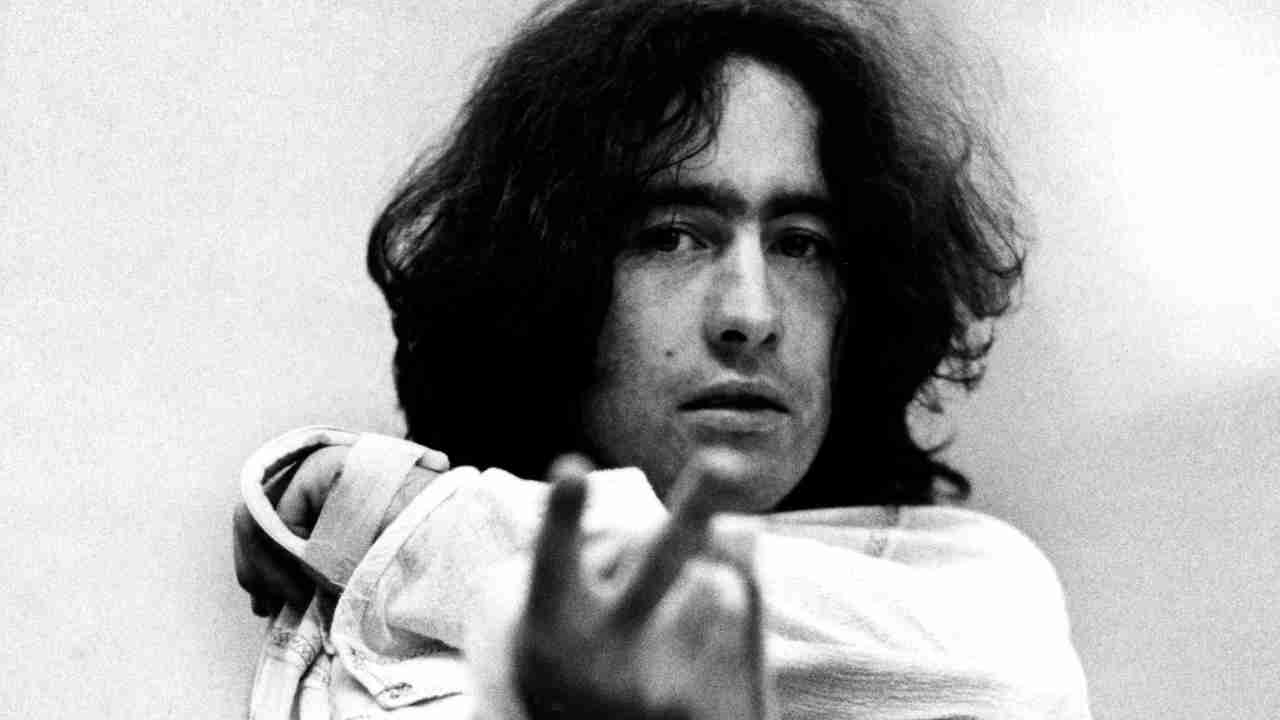
And then there was the name. Rodgers initially had doubts: “I’ll be honest, when we started out I thought maybe we’d call ourselves May Taylor Rodgers, or something like that. But I didn’t mind Queen+Paul Rodgers because I think it has a good identity.”
Was there a big discussion about it?
“Not really, when Brian called me up and said how ‘Do you fancy doing it as Queen+Paul Rodgers?’, I took a deep breath and went ‘Whoa!’ But said, ‘Let’s give it a try and see it works.’”
Taylor says he didn’t really know what they would call themselves. “We just thought it was going to be us and Paul and it would turn out to be what it turned out to be,” he shrugs. “It was an organic process. There was no overall master plan really.” And as far as he was concerned, the “us” was Queen.
Ever the pragmatist, May simply answers: “It’s what we are. We had to call it something.” Discussion over.
May, though, was prepared to spend a bit of time considering the talents of Rodgers and Mercury and the contrasts in working with both within the band framework.
“That’s a very difficult question to answer. There are many similarities between Freddie and Paul and there are many interesting differences. But it’s hard to put into words, just feelings really,” he says. “Paul is a very creative guy and if you throw something at him, he will throw it back at you in a way that you didn’t imagine. And that’s exactly what Fred would do, lateral thinking was one of his great assets.
“Having said that, there are differences in the way the relationship worked. One of Freddie’s great talents, strangely enough, was diplomacy. He was very good at getting Roger and I, for instance, to sort out our differences and work as a team. Why would Paul even know that that was part of what went on with us? Gradually, he has become part of that.
“Three is a strange number in a group. If you have two people that want to do something and one doesn’t, then people can get pulled a long way in a certain direction. In the end we had to get to know each other very well to get this thing to work. But Paul brought some very different ways of working to us. He’s very instinctive. You sing something for Paul, a tune you’ve got in your head. He will process it for a while and won’t sing it at all until he feels it and understands it and then interprets it in his own way. So what you get back from Paul is – I’m tempted to say a blues interpretation because blues is very much a part of what he is – but it’s more than that. Working on the album with Paul was a real voyage of discovery.”
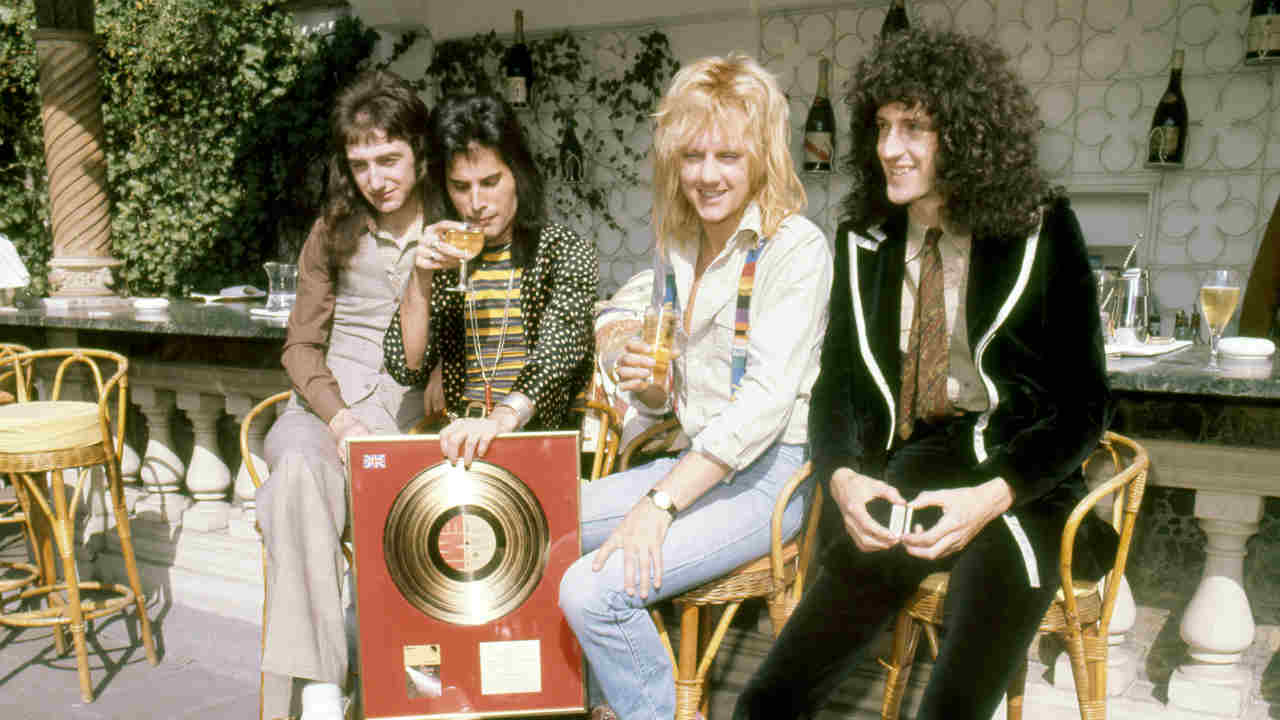
It seems that many old-school Queen fans have, or at least had, the misguided impression that Paul Rodgers had “lucked out” in getting the gig with the band, forgetting, of course, that the vocalist superseded Queen in many ways – rock history, chart success and the like.
“I think that was a fairly widely held perception. The fact is that Free were famous long before we were,” Taylor emphasises. “Paul was one of Freddie’s role models in a way. You’ll find a lot of singers citing Paul as being the blues benchmark for rock vocalists.”
“It’s a very interesting territory we’re marking out now,” continues May. “It hasn’t been planned. The links are there, though, very much with us, because Free was a great influence on us in the early days, and particularly an influence with Freddie. He really regarded Paul Rodgers as a hero. Those guys were stars before we were twinkles in each other eyes. Free were, and are, a great inspiration. Fire And Water was one of our reference points along with The Beatles and Hendrix.”
And so, for the past two years, Queen have intermittently been holed up for a month at a time working on original material at Roger Taylor’s fully-equipped home studio in Surrey. The only other attendees were the technicians who would help them record. Once they had made the decision to make an album together, it seems that Taylor became project manager. The drummer was the one that would pull it all together and present the packages to his partners when they re-convened. Brian May was busy finishing his PhD in astrophysics, among other academic pursuits (“He’s only been working on it for a hundred and thirty years,” jokes Taylor). Paul Rodgers lived on the West Coast of Canada and had other musical commitments apart from his part-time Queen gig. They had no bass player, so those parts were divvied up between May and Rodgers, both proficient players of the four-string.
Each of them would bring the early stages of what they had written to each session, although in the end, everyone’s contribution was deemed worthy enough that all tracks would be credited as written by May/Rodgers/Taylor, something that never happened with the “old” Queen.
“You know, all musicians are buzzing round with ideas, all the time,” said Rodgers. “The question is always ‘Will your ideas gel with the other musicians and make a track?’ And we found very excitingly that we could.”
Of course, they were all rich enough to know that if what they were doing was a load of shit, they could just flush it down the toilet.
“One thing I absolutely knew for sure was that it would not be shit,” laughs the singer. “Because of the calibre of the musicians I was working with in Roger and Brian, and as I know what I can do, I knew it would be something special.”
Taylor agrees: “Absolutely! And some of the stuff didn’t work. So those songs didn’t make it.”
They were also aware that it couldn’t be like anything they had done before, either as Queen or Paul Rodgers, who comments: “We had no preconceptions about going into the studio – ‘just bring your ideas’. And the thing that I like about working with Brian and Roger is that they are very original musicians. They don’t approach a song with the attitude of just putting guitar and drums on it. They have an approach of ‘How can I put something on this that has never been done before even by me. And I’m like that too.’”
They’re buzzing about the fact that many of the backing tracks came from one-takes live in the studio, on songs like Voodoo.
“On that track, I was just playing an acoustic guitar, Roger got on the kit and Brian was just playing his guitar, and we just jammed. And that went on the record pretty much as we recorded it. And that’s not really what you expect from Queen, is it? Other songs have been full-on production with massive harmonies, but each song on the album is different.”
It was quite similar in some ways to Queen’s old studio methodology, Taylor reveals. “I was able to do a lot of preparation and then the others could pick and choose and then we would all develop the tracks. It didn’t matter who had the first idea, we all developed the songs between us. It is a really good process, very creative. A proper group process!
”This is different from before but the same, sort of. The thing with Queen was that we were a real group. Everybody worked pretty much on everything. Certain things were little bits of flights of fancy or songs that involved pretty much one person. But a lot of it was absolutely the group, and everybody firing in ideas and everybody working as a unit. Like now.”
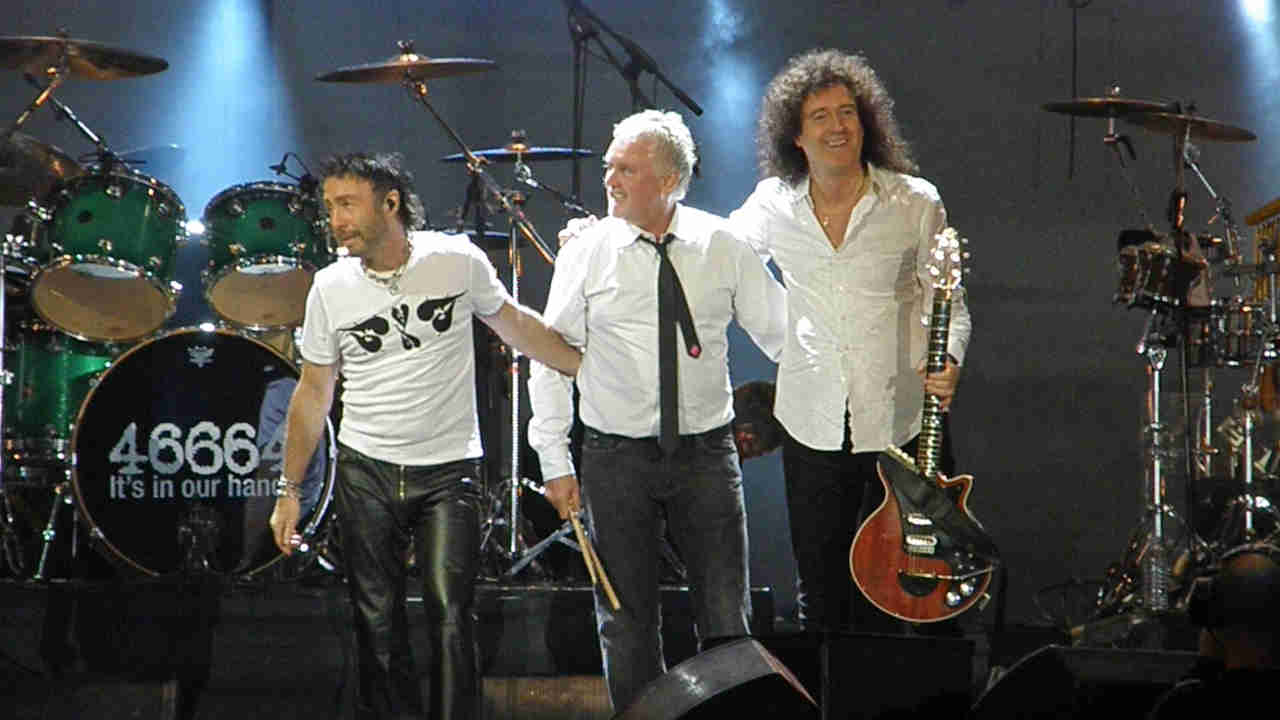
I remember at that Night At The Opera interview in ’75 in the immediate aftermath of recording the album, May seemed a bit distant, not quite sure if he had delivered the quality of work he could have. Insecure, almost. As we talked about the recording of The Cosmos Rocks, he seemed to be thinking too much again as he recalled the process of making the album. He had been immersed and engrossed in his PhD which he would work on on his trusty laptop while on tour. But once they had set deadlines to actually release the album, matters became much more serious.
“An album is a dreadful thing to do really,” May ponders. “It’s such a big part of your life and it always gets painful at a certain point. And this was no exception. We had a lot of fun, we did a few sessions over the course of a couple of years, but once you’ve got a deadline and you know you have to deliver, it becomes very serious indeed. The same old problems rear their heads. It’s very difficult. In this case, it’s three different artists with paintbrushes trying to paint the same canvas.
“You get to a point eventually where some really difficult decisions have to be made. It’s a democracy. That’s all you can say and that’s the way it was in the old days as well.”
Queen had all this worked out in their former life, I imagined. How did May react to the new third man?
“Paul’s great. He’s very mellow and very well adjusted. He’s a very evolved human being. He’s nice to work with, no doubt about it, but of course, he’s also still a hero to us in some ways so perhaps we’re very polite to him. He’s still ‘Paul Rodgers’. We get the moments where it’s, ‘Oh, that’s Paul Rodgers’.
“Roger and I – for different reasons – are very polite to each other because we know how it can go. We’re like brothers and we can fight badly; so we were all very polite to each other for a very long time and perhaps we didn’t air the things that were worrying us. And, of course, there comes a point where suddenly the worries become crucial and you have to bring them out, and then it’s a difficult time. But that’s part of the creative process, and we all know it. You can’t really make an album without that painful burden, so we buckled down to it and worked our way through it all.”
So it was painful?
“Yes, the last bit was, particularly for me. We all have lives as well and to be sucked in to that extent that you can only eat and sleep and be in the studio is a painful thing in itself. It grinds you down after a while. The final mixes which is where a million decisions are made; the sequencing of the album, deciding who did what. It’s like being in a new group. These things come with every bunch of boys that come together. Eventually you think, ‘How much of this is me?’, ‘Am I represented?’, ‘Am I being marginalised?’ All these childish concerns come up. You have to be very grown up to get through it.”
But Brian knows he’s made an album to be proud of. As does Roger. As does Paul. As would John. As would Freddie…
“I think it works well because we’re not trying to recreate anything that any of us have done before. We’re trying to be ourselves together, and that creates an entirely new entity,” says Rodgers.
“I guess if it is successful, we’ll be able to say, ‘Well, there you go, we can still do it. That was part of the driving force really, that we can still be a cogent force,” adds Taylor. “I think of The Cosmos Rocks as a Queen album with a twist. Very much so, because Queen has been my life, my profession. Most of my professional life has been this band. I’ve almost got it stamped through my core, like a piece of Brighton rock. It’s what I do, and we’re lucky enough that people are still interested.”
“We found that we could make a good noise. It comes from simple things like that,” concludes May. “We had the equipment in ourselves to generate a good joyful sound. It’s our love of rock’n’roll, and it’s still there, thank God. Of course, there are strong elements of all of our past, of Queen, Free and Bad Company. But it’s a new band.”
Originally published in Classic Rock issue 125, October 2008
